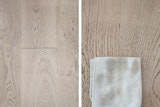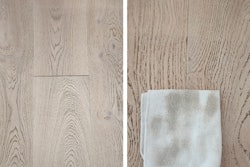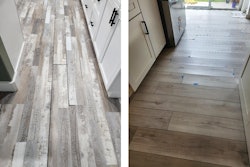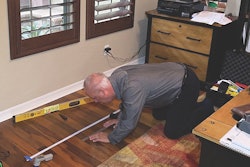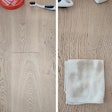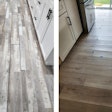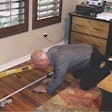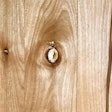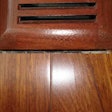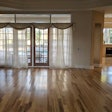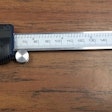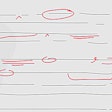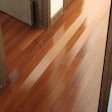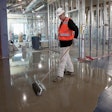The stakeholders in the inspection business are:
- the Consumer
- the General Contractor
- the Flooring Contractor/Retailer
- the Distributor
- the Manufacturer
- the Inspection Service provider(s)
- the NWFA.
In a perfect world the wood floor inspection process would resolve the complaint(s), eliminate mental stress, get invoices paid, minimize extra expenses, resolve conflict, settle disputes and lawsuits, and gruntle the disgruntled customer. But it's not a perfect world, so the inspection process should at the very least have the goal of completing the inspection part of the dispute by providing, with no conflicts of interest, accurate and objective information that all interested parties can then use to complete the negotiations. Let's face an unpleasant truth about disputes. When there are irrational or overly emotional (probably the same thing) or uncooperative or deceptive individuals involved in your dispute, even the perfect inspection is not a "silver bullet." Irrational, emotional, uncooperative and deceptive issues need to be dealt with contractually before the wood floor is delivered to the job.
Bad standards reflect on the entire industry. Inspectors with inadequate training, limited experience, improper temperament, and minimal skills do not have a positive impact because good standards administered poorly have the same negative effect on the entire industry as bad standards. Manufacturer warranties are not the same as wood flooring industry standards. Numerous industry standards are published by the U.S. Department of Commerce, ASTM, and ANSI, and, for the wood flooring industry, by various industry trade associations including MFMA, NOFMA, HPVA, and NWFA. If you don't know about these organizations, you can find information online. The Department of Commerce is funded by the U.S. taxpayer, but all of the other groups are supported by their dues-paying members.
The standards for professional wood floor inspections and conduct should be clearly stated and rigorously followed. It is equally important that the inspector exhibits common sense and good judgment. This is what can be thought of as the proper temperament when interacting with the interested parties and preparing an objective report.
The NWFA (1987-present) represents the interests of companies from manufacturing through installation, finishing and maintenance. It is the public persona of the wood flooring industry and has assumed many of the roles that were at one time the mission of NOFMA, which ceased to exist as a stand-alone entity when it merged with NWFA (1909-2008, R.I.P.). The construction industry looks to NWFA as the primary source for information regarding all things wood flooring, and NWFA has a widely respected brand.
Let's try a multiple choice question.
From the NWFA Programs listed below, choose the one that provides the least enhancement of the NWFA brand and service to ALL segments of NWFA membership.
a. Hardwood Floors magazineb. Annual NWFA Expoc. Wood flooring education and training programd. Publishing wood flooring guidelines and technical manualse. NWFACP Certified Inspector program
The correct answer is e, but there is a way to turn that lemon into lemonade and use inspections to enhance the NWFA brand and make it one of the important advantages of belonging to NWFA. This can be done by transitioning from the current system, which has not applied rigorous standards, to the experience, training, and competence of inspectors who are certified by NWFA to a system modeled after the NHLA Hardwood Lumber Inspection program (I talked about that program in my last blog post). Truth be told, this was the NOFMA complaint inspection system up to the point that financial support for NOFMA started to deteriorate in the late 1990s. It was one of the major benefits of being a member of NOFMA, because only NOFMA members could request an inspection, and only professional staff at NOFMA were permitted to conduct official complaint inspections.
You ask, "Howard, how did it work?" The NOFMA member would contact the Memphis HQ to request the inspection which required payment in advance for the cost of the inspection. Once the payment was received the inspection was scheduled then conducted. The official inspection report was written by the NOFMA inspector who actually conducted the inspection. The report was written in an objective manner to provide accurate information and analysis for the recipient(s) of the report to use to come to a settlement. Because of the high standards and reputation of the NOFMA inspection process, only a relatively small number of inspections resulted in formal litigation that required testimony in court.
Again you ask, "Howard, how does this improve the image of NWFA?" Currently with NWFACP certified inspectors there are very few controls for maintaining the excellence of these de-facto NWFA branded inspections. Whether we like it or not, there is a posse full of certified inspectors out there flashing their NWFA badges all over the open range. With a professional wood flooring inspection department comprised of an elite group of well-trained inspectors, NWFA branding is retained to benefit the entire membership because NWFA HQ is able maintain the highest technical and ethical standards. These elite inspectors could be full-time or part-time employees or subcontractors depending on the most advantageous business model. Only a member of NWFA would be able to request an official NWFA wood floor inspection as one of the benefits of membership.
Limiting access to PROFESSIONAL INSPECTIONS to members only or at a pricing differential promotes NWFA membership. If you are a reputable wood flooring contractor or retailer, don't you want to be assured of a fair and expert inspection? If you are a reputable wood flooring manufacturer or distributor, don't you want to be assured of a fair and expert inspection? If you are a consumer, don't you want to be assured of a fair and expert inspection? If you are an attorney representing your client, don't you want to be assured of a fair and expert inspection?
If you have read to the end of this blog, please accept my thanks. I have spent the majority of my adult life studying wood flooring and the important related topics that increase understanding, and have been teaching/training others since 1978. Unlocking the "secrets" to understanding is very strongly correlated to the willingness to put forth a great deal of effort developing an intimate familiarity with fundamental knowledge. It is about changing the way you think by making fundamental knowledge an integral part of your thought process. Information does not always move the ball forward because some of it is unadulterated "these good books that accurately describe fundamentals.










